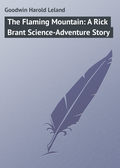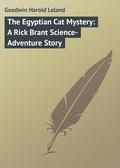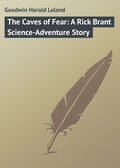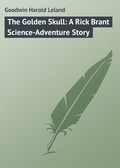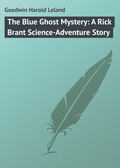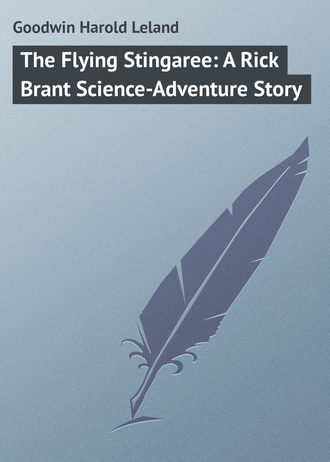
Goodwin Harold Leland
The Flying Stingaree: A Rick Brant Science-Adventure Story
CHAPTER XIII
The Night Watchers
Scotty, who had realized they were being shot at, was pulling at Rick's arm in frantic jerks, trying to lead him back into deeper water. Rick needed no urging. His fins thrashed in the shallows as he drove desperately for the safety of the deepest part of the cove, his hands keeping contact with the bottom.
The increased pressure on his eardrums told him they had reached the sanctuary of deeper water where the velocity of bullets would be absorbed before they could strike. He was bewildered. What had happened? Who was shooting? For a moment it crossed his mind that Orvil might be doing the shooting, but he dismissed it. He had no proof that the crabber hadn't suddenly turned on them; he just didn't believe it.
Yesterday Scotty had seen watchers on the shore, presumably from Calvert's Favor. Apparently the watchers were there now. The boys had gone into shallow water, and their tanks had shown above the surface, drawing fire. It was the only reasonable explanation. Probably the night watchers had seen the pole handed up to Orvil, or had seen the faint light reflecting from their masks.
What had happened to Orvil?
One thing was certain. They couldn't stay on the bottom indefinitely.
Rick consulted his wrist compass and closed his fingers on Scotty's shoulder. He led the way toward the mouth of the cove.
Somewhere on the shore, he thought, the night gunmen were watching the line of bubbles. The boys' only hope of escaping detection had been to avoid drawing attention to themselves. Rick knew that was impossible with watchers on the shore. Watchers at four in the morning was one thing he hadn't expected. What had drawn them?
Suddenly he knew. While he, Steve, and Scotty had examined the mansion through glasses from Orvil's boat, Merlin and company, or a single guard, had been watching them. They had drawn attention not only to Orvil, but to the time of day when the guards would need to be especially alert.
Bubbles would attract the guards' attention, not only because they foamed on the surface, but because they would leave a glow of phosphorescence. How far would bubbles and glow be visible? He had a mental image of the watchers following the shoreline. They couldn't cross the creek or its mouth to where Steve's runabout was stowed, but they could shoot that far, if they could see the bubbles.
The only way for Scotty and him to escape was to eliminate the bubble track. That meant not breathing. Not breathing was possible for a short time. During the interval, they could swim into the marsh grass and use it for cover.
Rick's thoughts raced. He tried to recall the shoreline. There must be some promontory, some outcropping of grass, behind which they could hide. Perhaps the best way was simply to swim directly out from the creek mouth until distance hid the bubbles and darkness shrouded two black-covered heads.
There was a problem, though. Scotty's air tank hadn't been used until now. Rick's had, during the initial search yesterday. He estimated quickly. Less air is used at shallow depths than at deeper depths. The water depth for most of the way was shallow enough so that tank time was essentially the same as swimming on the surface. He had had at least forty-five minutes of air to begin with, and it might be stretched to fifty minutes. He probably had used no more than forty minutes of air, total. But the remaining ten minutes would not take them out into really deep water in the river itself, and then back to shore. There was not enough air to take them to Steve's place.
He had to make up his mind. Scotty, undoubtedly, was doing some fast thinking along the same lines. Their thoughts usually followed the same track in such situations. Rick touched Scotty's side and forged ahead, heading straight out. He counted his kicks, estimating distance covered. When he reached a count of three hundred he angled right, toward the north shore of the Little Choptank. They were well out of the creek now.
When the water shoaled, he found Scotty again and pressed him down; then, very gingerly, he put his head above water, half expecting to feel the shock of a bullet.
There was a fallen tree nearby. He submerged again, touched Scotty, and led the way to its shelter. A cautious survey told him they were some distance from the creek mouth, and certainly invisible behind the waterlogged trunk and its load of leaves and other debris.
He put his lips to Scotty's ear. "Wonder what happened to Orvil?"
"We've got to find out," Scotty whispered back.
"Yes, but how?"
"We go overland."
Of course! They were on the same side as the boat, and not far away. There was the stretch of marsh between the channel and the creek. They could cross that, and overlook the creek. "Let's go," Rick whispered.
They inched their way along the fallen tree to the bank, then crawled slowly into the shelter of the marsh grass. The grass grew in a narrow swath at this point, with a tangle of scrub and trees deeper inland. They kept going until the scrub concealed them, listening for sounds from the creek. There was the beat of a motor. It sounded like Orvil's boat, and Rick thought it probably was. But would Orvil continue crabbing? Again the doubt came. Had the crabber tried to kill them? He couldn't believe it.
The boys stopped and slipped off their fins. "Lead on," Rick said softly.
"Okay. When we get to the boat, we'll wade across the channel and continue right on through the marsh grass to the bank of the creek. We'd better be as quiet as possible."
"I'm with you."
Carrying their swim fins, the boys started through the dense growth, Scotty in the lead. It was hard going. Mosquitoes whined in a steady swarm around their heads, but with the neoprene suits and helmets, only their faces and hands were exposed. Each traveled with one hand outstretched to fend off branches, the other hand waving the fins to chase the insects from their faces. The outstretched hands were wiped frequently across the suits to get rid of the pests.
Rick was careful to step where Scotty stepped. When it came to silent tracking at night, the ex-Marine had few peers.
The two skirted the shore, keeping within the tree belt, until more marsh grass warned them that the water was near. The ground gave way to mud, and the mud to water. They stepped into the narrow channel up which they had gone to the blind. They now were less than two yards from the runabout. Scotty turned at once, and keeping to the water, moved upstream. Rick followed, careful not to splash. The darkness was less dense than under the trees, but he could not make out any details.
The channel ran roughly parallel to the creek, with a strip of land about thirty yards wide between the two. When Scotty estimated they were even with the cove, he left the channel and moved into the marsh grass again. Rick followed closely, careful to make no noise. In spite of their best efforts there was an occasional sucking sound as his foot or Scotty's pulled out of the muck, and there was a steady rustle of marsh grass. He hoped that the sounds were drowned out by the steady chugging of Orvil's motor.
Scotty slowed to a cautious pace and Rick knew they were approaching the creek bank. The marsh grass did not thin appreciably. Rick wondered if the night watchers could see the tassels of the grass waving as they approached, and decided that the small motion probably was invisible against the high bank of trees farther inland.
Rick stopped as Scotty turned. Soundlessly, Scotty lowered himself to the mud, then inched ahead, moving each strand of marsh grass with care. Rick followed suit, and crawled in Scotty's track until he saw the glimmer of water. Then, moving with great caution, he drew alongside his pal. They looked out into the cove through a thin screen of grass stalks.
Orvil Harris was crabbing, as unconcerned as though nothing had happened. As Rick stared, disbelieving, the crabber's net swooped.
The crab boat moved on, exposing a glow on the opposite bank. Rick sucked in his breath. He could make out the forms of two men. One was smoking a cigarette. Both carried rifles.
CHAPTER XIV
Daybreak
Rick tugged at Scotty's suit, then crawfished backward through the marsh grass until he was sure the night watchers could not see him. He stood up, and Scotty joined him. Rick motioned toward their own boat.
The boys made their way back through the swamp to the runabout in almost total silence, each busy with his own thoughts.
Orvil Harris was crabbing as though nothing had happened, while the night watchers stood in plain sight on the opposite shore. Orvil must have seen the shots fired, Rick was certain. Even if he had been looking the other way, the first shot would have caught his attention.
Or, Rick wondered, had Orvil tipped off the two guards that divers were below? If so, the game was up. Once Merlin and company knew the payload had fallen into the cove, they would be diving for it themselves, under cover of guns. Merlin undoubtedly knew that the launching the evening of the squall had gone wrong, but he couldn't know how, or where.
But somehow, Rick didn't think Orvil had been a party to the shooting. Maybe it was stubbornness, refusing to think the crabber was involved just because they liked him. Or maybe it was because the crabber had no reason for helping Merlin and his gang; at least Harris had no reason known to Rick and Scotty.
They reached the boat and conferred in whispers that were inaudible six feet away.
"Could Orvil have put the finger on us?" Scotty questioned.
Rick shrugged. "I don't want to think so, and I don't. But I have to admit it's possible."
"If he's in with them, they'll be diving for the 'what's-it' at first light."
Rick glanced at the eastern sky. It was beginning to glow with the first hint of daylight. "That's not long from now."
"How are we going to recover it first?"
Again Rick shrugged. "There's only one way. Go in and get it."
"Under those guns?"
"A diver on the bottom isn't in danger from the guns. I could find the thing again without going into the shallows. That's what made us targets before, because we took the easy way to locate the fish line by going into the shallows near where I tied the line."
"Let's see your tank," Scotty whispered.
Rick unsnapped his harness release and swung the tank around. Their probing fingers soon identified where the bullet had glanced off. There was a dent, coated with silvery metal.
"Lead," Rick said. "Part of the slug."
"Good thing it didn't rupture the tank."
Rick shuddered. "If it had, I'd have been out of air suddenly and would've had to come up. Listen, Scotty. My plan is a simple one. I'll take your tank, since you have the most air, and swim right into the cove, find the 'what's-it' and swim out again. If it's too heavy to tow far, I can at least wrestle it part of the way, and then bury it in the mud. Meanwhile, you get the boat out where it's clear and be ready to pick me up."
"They'll see your bubbles, but they can't do anything about it with rifles," Scotty pointed out. "One thing they can do, though, is jump in after you. The cove isn't so deep that a pair of good swimmers couldn't tackle you. The lung wouldn't improve your chances by much."
"Too true," Rick observed. "But what else can we try?"
Scotty thought it over. "Listen, we'll take the boat out right now. You'll have to do the diving, because you know about where the thing is, and I don't. When we get out, you go over the side. I'll run around to the river, opposite where the guards are standing, and raise a little fuss. That might draw their attention away from the cove."
"Okay." It made sense to Rick. "They'll see both of us in the boat, but they won't see me get out. Only you'd better plan our course. I have no aching desire to collect a rifle slug where it hurts."
"They may not shoot if they see we're leaving," Scotty pointed out.
"Uh-huh. And they might shoot, anyway."
"They might. But we'll be moving fast, and I'll swing that boat from side to side like a swivel-hipped fullback. Let's get going. We don't want too much daylight."
Scotty unsnapped his harness and Rick took his pal's tank and regulator. They put Rick's unit in the bottom of the runabout cockpit, along with Scotty's fins and mask. Rick put on his own fins and made sure he was ready to hit the water at a moment's notice.
Rick went to the stern of the runabout and felt down the motor leg to the prop to make sure it had not picked up any grass that might slow them down. It was clear. Scotty, meanwhile, untied the boat and slid into the driver's seat. Rick reached over the transom and pumped up the gasoline tank to ensure plenty of pressure, then he waded to the side of the boat and got into the seat next to Scotty.
"Pull us out to where the nose is almost projecting beyond the grass," Scotty whispered.
Rick did so, by grasping clumps of marsh grass and pulling the boat along. As the bow cleared the grass, Scotty punched the starter button, threw the runabout into gear, and shoved the throttle all the way forward.
The runabout jumped forward, slamming Rick back against his tank. The boat hit the shoal at the entrance and slowed for a long, breathtaking moment, then the driving prop pushed it over into deeper water. The stern went down and the bow lifted, and they were clear.
Scotty swung the boat to the right, putting its stern to the cove. Rick tensed, expecting any moment to feel the impact of a rifle bullet, either in the boat or in his own body. There was no sound other than the racing motor, and he knew it would drown out the crack of a distant rifle.
The distance from the cove entrance widened. "Get ready!" Scotty yelled. "Lay flat and be ready to roll. I'll turn so the motor is moving away from you. When I tap you, we'll be directly in line with the cove entrance."
Rick moved out of the seat, keeping low, and lay on his side along the gunwale, facing Scotty. He put the mouthpiece in place and made sure he was getting air, then pulled his mask down. He was ready. The impact with the water would be hard, at this speed, but his tank would cushion the shock. He tensed for the signal.
Scotty swung the boat to the left, held it on course for a moment, then began a shallow turn to the right. That way, the motor would be steering itself away from Rick when he went over.
The boat came abreast of the cove entrance and Scotty slapped Rick on the shoulder. Instantly Rick rolled, one hand reaching for the back of his head, the other grabbing his mask. He hit the water on his back, his hand and the tank breaking the shock of the stunning impact. He threw his legs upward, and his momentum took him under the water instantly.
The racing motor receded, leaving him in silent darkness. He rolled over into normal swimming position and consulted his wrist compass. The creek entrance ran on a course of 80 degrees. If Scotty had gauged things correctly, that course would take him into the cove. If Scotty hadn't, Rick Brant would end up on the beach like a stranded whale.
Rick considered. The boat was gone, and it was extremely unlikely anyone had seen him leave it. The turn had caused the boat to tilt, lifting the side away from him. He was certain that the guards had not seen the maneuver. That being so, and taking into account his distance from the creek entrance, he thought it would be safe to look and check his course.
He held the compass in front of his eyes, and rose to the surface. He broke through slowly and without a splash. One look was enough. He should have trusted Scotty. He was dead on course.
Rick went to the bottom and began the long swim, counting his leg strokes. He and Scotty had practiced estimating underwater distance by the number and timing of their leg strokes. It wasn't an exact method, of course, but it was practical.
There were no underwater obstacles, and the depth was great enough. Rick remembered from the chart that the entrance into the creek varied from eight to eleven feet, dropping inside the creek mouth to about seven. No bullet could harm him if he stayed on the bottom. If the night watchers fired, the bullet would be slowed by the water.
He heard the sound of a motor and recognized it as the runabout. The sound faded again. Scotty was going through some kind of maneuvers. Then, in a short time, another motor made itself felt, more than heard. The slower beat identified it as Orvil Harris's crab boat. He was nearing the cove!
Like all divers, Rick's ears were sensitive to pressure changes. Sensing when the depth lessened, he knew he had reached the cove itself. Now to find the payload – if it was a payload. His groping hands began the search.
The first foreign object he touched was a cord. It was the wrong thickness for his own line, and he felt along it until he came to a soft, round mass, and knew he was touching one of Orvil's crab baits. He grinned in spite of the mouthpiece. Wouldn't Orvil be surprised if a diver came up hanging to his bait!
He let the crab line drop and continued his search. Once, Orvil passed within a few feet of him, and Rick wondered if the crabber had noticed the air bubbles from his regulator.
Rising ground told Rick he had reached the end of the cove. He turned left and held his course for about twenty feet, then turned left again, heading back toward the cove entrance. His hands never stopped moving, probing the mud for a trace of fish line. He crossed another of Orvil's crab lines, and kept going until pressure change told him he was back in the deeper water at the creek entrance. He turned right again. A check of his compass told him he was on course.
His groping hands trailed over a thin line. He grabbed it, and stopped his flutter kick. Then, moving with care, he turned and followed the line. His pulse was faster now, and he rigidly controlled his breathing. Fast breathing wouldn't do, and he would have to be careful not to let out a sigh that would cause bubbles to gush upward in one big rush.
A hand found the end of the line and the smooth cylinder to which it was attached. Orvil passed very close, and Rick looked upward. He could see the white circle of water around the single propeller.
Now to find out what he had. His hands stroked it from one end to the other. One end was rounded. The other was a circle with an odd-shaped hole running into it. Rick poked his finger in, but couldn't feel the end of the depression. The only protuberance on the thing was a band near the rounded end. The band felt like metal, and had two rings projecting from it. The rest of the cylinder didn't feel like metal. The texture was that of a smooth plastic.
Rick lifted the object gingerly. It was hard to estimate weight under water, but he thought ten pounds would be about right. The total length was less than three feet. It would be easy to carry.
This time he needed a reciprocal compass course. It would be 260 degrees going out. He oriented himself properly, picked up the cylinder, and began the long swim back. He wondered if Merlin's guards were watching his bubbles. He had seen no sign of bullets, but he hadn't been looking for them. With Orvil's motor so near, it was likely he would not have heard the slap of a bullet on the water.
Pressure told him he was out of the cove. He breathed a little easier. Now to count leg strokes again. He looked up, and saw that the surface of the water was shining with light, the first rays of true daylight. Scotty would have no trouble finding him.
Because of the daylight, he continued on for a distance beyond where Scotty had dropped him. No use giving the guards too good a shot. Finally, exhausted, he surfaced. He lifted his mask and surveyed the scene.
Orvil Harris was still crabbing. Rick could see the boat, but the angle was wrong for him to see the crabber at work. He turned slowly in the water, and saw Scotty. The runabout was floating, motor off, about a mile away. He lifted an arm. The glint of first sunrise turned the lenses of Scotty's binoculars into a crimson eye, and Scotty waved back. In a few seconds Rick heard the motor start and saw the boat racing toward him. He kept his mouthpiece in place, and floated, waiting.
Scotty came alongside and reached down. Rick handed him the cylinder. Scotty put it on the seat without even looking at it. He gave Rick a hand and pulled him over the side. He asked anxiously, "Are you all right?"
"Done in," Rick said wearily. "But otherwise okay."
"Let's get out of here." Scotty put the runabout in gear and headed back toward Martins Creek.
Rick sat down and picked up the cylinder. There was a gob of mud still on it. He wiped it off with his hand and examined the thing. The material was fiber glass set in resin, and it was designed so the rounded nose could be removed. He didn't remove it, however. Instead he looked at the other end, down into the hole with the puzzling shape. It was like a cutout Star of David in shape, the hole gradually narrowing until its apex was almost at the other end.
The light dawned. Rick's lips formed the word. "Grain."
Scotty was watching. "What?"
"Grain," Rick said again. "This thing is a small solid-propellant rocket!"



